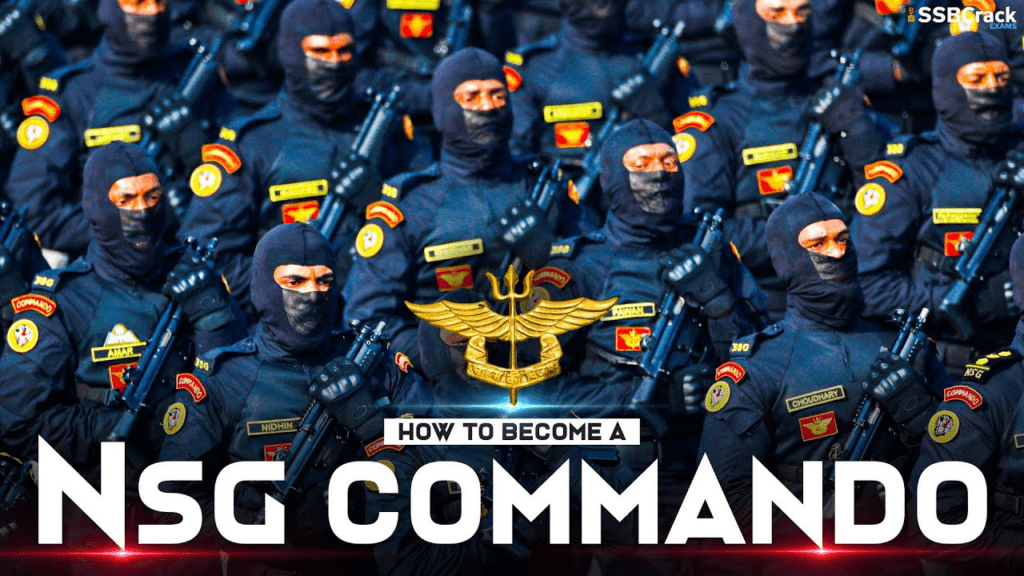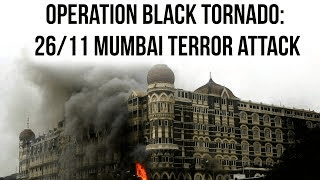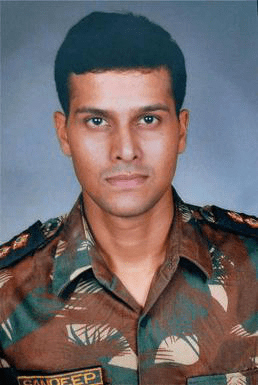The National Security Guard (NSG) specializes in counter-terrorism and special operations in India. It was established in 1984 in response to the growing threat of terrorism in the country. The main task of the NSG is to deal with situations involving terrorism, hostage rescue and other serious security threats.
What is NSG?
History of NSG
The National Security Guard (NSG) is a special counter-terrorism and special operations force in India. It was established in 1984 in response to increasing incidents of terrorism in the country. Here is a brief history of the National Security Guard:
- The need for special forces in the fight against terrorism and hostage situations became evident after that incident.
- The SAG consists of specially trained commandos who conduct counter-terrorism operations, while the SRG supports and secures NSG operations.
- Training and Skills: NSG commandos undergo rigorous training including marksmanship, tactical skills, close combat, hostage rescue and bomb disposal.
- The NSG is capable of responding to a variety of threats, including terrorist attacks, hijacking, hostage situations and other acts of violence.
- Operations and Deployment: Over the years, the NSG has been used in several major operations in India.
- Some important actions are:
- Operation Black Thunder in Punjab (1986 and 1988) to counter Sikh terrorists, Operation Ashwamedh in Jammu and Kashmir (2002) against militants and Operation Black Tornado during the Mumbai attacks (2008) where NSG commandos played the role of Sikhs.
- International cooperation: NSG also cooperated with foreign counterparts and participated in joint exercises and training programs with special forces of different countries.
- Recent Developments: In recent years, NSGs have been modernized and re-equipped to further enhance their capabilities.
- The force continues to evolve and adapt to new threats and challenges in the field of counter-terrorism.
How to Join NSG



To become an NSG (National Security Guard) commando in India, you must meet certain criteria and undergo rigorous training. The NSG is an elite counter-terrorism unit with a highly competitive selection process. Here are the general steps to become an NSG Commando.
- NSG mainly recruits Indian army candidates.
- Join the Army through a prescribed selection process like the Combined Defense Services Examination (CDSE) or the National Defense Academy (NDA).
- Explain the selection process including written tests, physical fitness tests, medical examinations and interviews.
- After military service, you must serve a certain number of years to gain experience and develop the necessary skills.
- Gain expertise in relevant areas such as counter-terrorism, combat training, weapons handling and physical fitness.
- The NSG conducts internal army selections to identify potential candidates.
- Apply for NSG selection process when released.
- The NSG selection process involves a series of physical, written, medical and psychological tests.
- The tests are designed to assess your physical fitness, mental flexibility, judgment and general suitability for command operations.
- Prepare yourself physically and mentally for the selection process by following a rigorous exercise program and seeking guidance from experts.
- The training period can last several months and will test your physical stamina, mental toughness and teamwork skills.
- After completing the training, you will be posted to the NSG unit.
- If you meet the required standards and prove your skills, you will be formally invited to become an NSG command.
Eligibility Criteria
To join the National Security Guard (NSG) command in India, you have to fulfill certain requirements. The NSG specializes in counter-terrorism and special operations, and the selection process is rigorous. Here are the general eligibility requirements to join NSG Commando:
Nationality: You must be a citizen of India.
Age: The age limit for NSG Commando varies according to the category of the candidate:
General Service Category (GD): 18-28 years. For a special class (including commandos, snipers, doctors, etc.): Up to 32 years. Ex-servicemen: The upper limit has been relaxed as per government norms. Educational Qualification: You must have passed at least 10th standard (SSLC) for GD category. A university degree may be required for special duties.
Physical Fitness: You must meet the physical fitness requirements set by NSG. This includes criteria such as height, weight, chest measurement and endurance tests. Specific requirements may vary depending on the role applied for.
Medical Fitness: You must be in good physical and mental health and free from any medical conditions that may interfere with your ability to perform command duties. A medical examination will be performed to assess your condition.
Experience (For Ex-servicemen): If you are an ex-serviceman applying for NSG, you should have served in the armed forces with a good service history.
Responsibilities of NSG Commando
NSG (National Security Guard) commandos have several responsibilities, primarily related to counter-terrorism and national security. Here are some of the key responsibilities of NSG commandos:
- They are used in situations where there is a threat of terrorism, including hostage situations, hijackings and terrorist attacks.
- VIP Security: NSG commandos are responsible for providing high-level security to important dignitaries, including politicians, diplomats and senior officials.
- They are trained to handle security information, secure premises and ensure the safety of dignitaries during events and public appearances.
- Quick response: NSG commandos are trained to respond quickly to any emergency situation threatening national security.
- Training and Assistance: NSG commandos are also involved in training and assisting other security forces and law enforcement agencies.
- They work closely with intelligence agencies to gather information, analyze it and develop strategies to counter potential threats.
- PR: NSG commandos are ambassadors of the force and are responsible for maintaining a positive public image.
- They often participate in public events, demonstrations and exhibitions to demonstrate their skills and raise awareness of their role in national security.
Role of NSG Commando in India's Internal Security
The National Security Guard (NSG) is a specialized counter-terrorism force in India that plays a key role in the country’s internal security. NSG Commandos are highly trained and professional personnel specially designed for counter-terrorism operations, hostage rescue and other exceptional situations that pose a serious threat to national security.
- Anti-Terrorist Operations: NSG commandos are primarily trained and equipped to counter terrorist threats, including neutralizing terrorists, securing sensitive areas and minimizing collateral damage during counter-terrorism operations.
- They undergo rigorous training in close combat, hostage negotiation and tactical assault techniques to safely rescue hostages and neutralize the hostages.
- They are trained to maintain close protection, a safe environment and to respond quickly to potential threats or attacks.
- Tactical Training and Assistance: NSG Commandos provide specialized training and assistance to the country’s police forces and other security agencies in dealing with terrorism and hostage situations.
- Bomb Disposal and Forensic Investigation: NSG commandos are trained to deal with Improvised Explosive Devices (IEDs) and other explosive devices.
- They are skilled in bomb disposal techniques, post-explosion analysis and forensic investigations related to terrorist attacks.
- They cooperate with other security agencies and act as rapid response forces to restore order and provide assistance in such emergency situations.
Lifestyle of a NSG Commando
The NSG (National Security Guard) command is characterized by discipline, rigorous training and dedication to the service of the country. NSG commandos are highly skilled and specialized personnel trained to conduct high-risk operations including counter-terrorism, hostage rescue and anti-capture missions. Here are some aspects of their lifestyle:
- Training: NSG commandos undergo intensive and thorough training programs.
- They are trained in various things such as marksmanship, close combat, explosives handling, tactical operations and intelligence gathering.
- The training is physically and mentally demanding and aims to improve their skills, stamina and judgement.
- Physical fitness ensures that they can withstand the rigors of their duties and perform optimally in high-stress situations.
- Mental Strength: NSG commandos are trained to remain calm and composed under pressure.
- They develop mental resilience through simulations, scenario-based training and exposure to stressful situations.
- This readiness includes regular drills, equipment checks, and keeping up with the latest tactics and techniques.
- Dedication and Sacrifice: NSG commandos have a strong sense of duty and are ready to make personal sacrifices for the greater good.
- Special Equipment and Weapons: NSG commandos are equipped with state-of-the-art weapons, tactical equipment and special equipment.
- Teamwork and camaraderie: NSG commandos work in close-knit teams.
- Continuous Training and Skill Development: NSG commandos undergo continuous training and skill development programs to stay abreast of the latest techniques and tactics.
- They are entrusted with confidential information and maintain strict confidentiality to ensure the security and success of their operations.
- They prioritize physical and mental well-being, spend time with their families whenever possible, and engage in recreational activities to recharge and maintain a healthy work-life balance.
Salary of NSG Commando
However, I can give an overview of the NSG command pay scale based on my knowledge based on the available information. NSG Commandos usually come from the Indian Army and their pay is in line with the Army Personnel Pay Scale. The pay structure of Indian Army personnel is based on the Seventh Pay Commission.
Ranks |
Pay |
|---|---|
| Sepoy/Rifleman |
The starting basic pay for an entry-level commando is around Rs. 21,700 to Rs. 69,100 per month. |
| Lance Naik/Naik |
Basic pay ranging from approximately Rs. 25,500 to Rs. 81,100 per month. |
|
Havildar |
Basic pay ranging from around Rs. 29,200 to Rs. 92,300 per month |
|
Subedar Major: |
Basic pay ranging from approximately Rs. 39,900 to Rs. 1,20,900 per month. |
NSG vs. Para SF
Here is a comparison between NSG (National Security Guard) and Para SF (Special Forces) in tabular form:
| Features | NSG | Para SF |
| Acronym | National Security Guard |
Para (Special Forces)
|
| Established | 1984 | 1966 |
| Headquarters | New Delhi | Agra |
| Command | Ministry of Home Affairs |
Ministry of Defence
|
| Roles | Counter-terrorism, hostage rescue, VIP protection, disaster relief |
Special operations, unconventional warfare, counter-insurgency
|
| Training | 9 months | 2 years |
| Strength | 7,000 | 10,000 |
| Equipment | Heavily armed with assault rifles, sniper rifles, explosives, and other weapons |
Lightly armed with assault rifles, sniper rifles, and other weapons
|
| Deployments | Domestic and international | Domestic only |
Operation Black Tornado



Operation Black Tornado was the code name of a National Security Guard (NSG) counter-terrorism operation to end the 2008 Mumbai attacks. The operation was launched on 27 November 2008 after 10 heavily armed terrorists from Pakistan carried out a series of coordinated attacks in Mumbai, killing 164 and injuring over 300.
The NSG commandos were moved from New Delhi to Mumbai and divided into four teams, each tasked with attacking one of the four hotels attacked by the terrorists: Taj Mahal Palace Hotel, Oberoi Trident Hotel, Nariman House Jewish Community. and Chhatrapati Shivaji Terminus Railway Station.
The operation was very difficult and dangerous because the terrorists were heavily armed and took hostages. The NSG commandos fought their way through the hotel room by room and eventually killed all the terrorists. However, 10 NSG commandos and several civilians were also killed in the operation.
Operation Black Tornado was successful as it ended the Mumbai attacks and killed all the terrorists. However, it was also a costly operation in which 10 NSG commandos and several civilians were killed. The operation also highlighted India’s need to improve its fight against terrorism.
Here are some of the main events of Operation Black Tornado:
* On November 27, 2008, NSG commandos arrive in Mumbai and begin the operation. * Commandos attack Taj Mahal Palace Hotel and Oberoi Trident Hotel. * Commandos rescue several hostages from Nariman House Jewish Community Center. * Commandos kill all terrorists at Chhatrapati Shivaji Terminus railway station. * The operation ends on November 29, 2008, when all 10 terrorists are killed.
The operation was very successful for NSG and Indian security forces. It showed that India is capable of responding to major terrorist attacks and that it has the means to defeat terrorists. However, the operation also showed that India needs to improve its fight against terrorism. The NSG commandos were significantly more violent at the hands of the terrorists and suffered significant casualties. The operation also highlighted India’s need to improve its information-gathering and sharing capabilities.
Despite the challenges, Operation Black Tornado was a great success. It showed that India is capable of responding to major terrorist attacks and that it has the means to defeat terrorists. The operation also helped boost morale in India and sent a message to terrorists that India would not tolerate their attacks.
Our Hero Late Major Sandeep Unnikrishnan



- Major Unnikrishnan was born on March 15, 1977 in Kozhikode, Kerala, India.
- He was later inducted into the National Security Guard (NSG), India’s elite counter-terrorism force.
- During the 2008 Mumbai attacks, Major Unnikrishnan led a group of NSG commandos tasked with attacking the Taj Mahal Palace Hotel.
- Major Unnikrishnan is considered a hero for his bravery and sacrifice.
- He is an inspiration to many people and his story reminds us of the sacrifices made by the men and women serving in the Indian Army.
FAQ's about NSG
Q: How is the NSG deployed during operations?
A: The NSG can be deployed in various ways depending on the nature of the operation. They may be inserted by air, land, or sea, and they utilize a wide range of specialized equipment and tactics to carry out their missions effectively.
Q: Does the NSG have international cooperation?
A: Yes, the NSG engages in international cooperation and exchanges with similar specialized units from other countries. They participate in joint training exercises and share experiences and best practices in counter-terrorism and special operations.
Q: How does one contact the NSG in case of an emergency?
A: In case of an emergency, the general public should contact the local police or emergency services (such as dialing 100 in India) who will coordinate with the NSG if their involvement is required.
Q: Are there any NSG training facilities open to the public?
A: No, NSG training facilities are not open to the public. The training conducted by the NSG is highly specialized and classified, and access is restricted to authorized personnel only.






